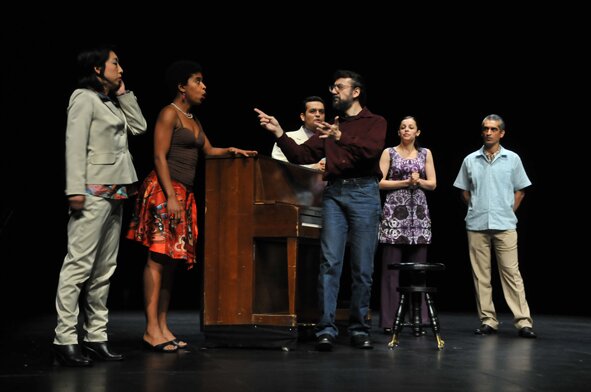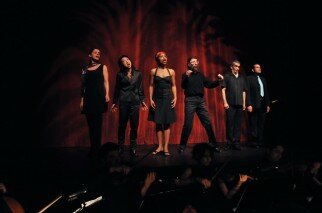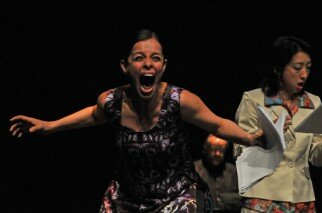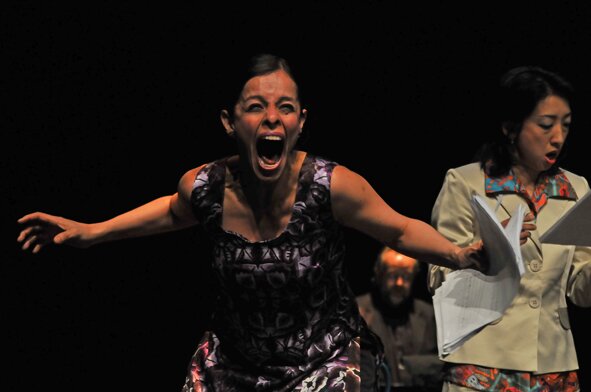
At turns whimsical, surreal, and yawn-provoking, El Gallo (at On the Boards through May 15, tickets), is the kind of show that I imagine “show people” are most likely to take to. The set-up is that a conductor/composer has two weeks to find and rehearse a quintet, and the show takes you through the esteem-testing of auditions and soul-cauldron of rehearsal, before the big night. At different times it plays like rehearsal reality TV, a winking farce, and performance art that dares you to fail to find it interesting.
Writes Teatro de Ciertos Habitantes director Claudio Valdés Kuri:
El Gallo is a tale of the confrontation of desires and aspirations. It talks about how when faced with the challenge of concrete objectives, we become oblivious to the richness and diversity of our current surroundings.

In real life, the performers (from Mexico, France, Japan and Iran) recapitulate the polyglot nature of the fictional troupe, though with the meta-comedy of Kuri and composer Paul Barker having created a nonsense language that everyone speaks and no one understands.
Here’s a taste of that, from the program note:
Paul showany Kalipadi Kalipadi la la la la. Claudio nemi napo, “een ai uwi wina yawi nayame wina yame.” Shinofwe – buzhni zheve zhave vu aiu wia – zhiblink chabe: Ernesto (Viptim), oodooumpapapri: niwe papapra eento puweklobongt: “Shvejishwgvnijmlagenschigcht!” Kaveh (Shaktas) Eduum Hajhne woro udoof Itzia (Shaptes); Edwin (Thiktum) woopi-waas Ernesto (Viptim), een oodooumvoschup eef oodooumvoschlow, wijhne-wojhne www eef mmm (scablickski, djheva!). Irene (Shaktom) eef Fabrina (Jogbos) beetchy-beetchy iwoz toodamkost: “nemi napo chiwa!” Nuwishni 6 showany, perobut 6 wwwmmm!
The sharp-eyed among you will see that performers are named in there — Itzia Zerón (Shaptes) Irene Akiko Iida (Shaktom) Fabrina Melón (Jogbos) Edwin Calderón (Thiktum) Guillermo Proal (Shaktas) Ernesto Gomez Santana (Viptim) — but I think that’s likely all you’re liable to get from it. Sung and spoken, it frequently sounds like Muppets.
There’s a very dry humor at work here, in that choral singing is frequently done exactly like this. Choral pieces are often in a different language than the singer knows, and so the words are sung phonetically. Are you expected to know this? I wonder.
Much of what’s amusing about the composer’s auditioning of his subjects is his on-the-nose physical reactions to them “getting it wrong” — I should mention that the singers audition with real-world opera standards like “Mon coeur s’ouvre à ta voix,” “La donna è mobile,” and “Summertime.” (Yes, Porgy & Bess is an opera — Seattle Opera is doing it this summer.)
The pantomime of communication failure is always golden, but there is also subtly present (if you want to work it out for yourself) the analogy to the personal voice: the singers audition as how they’d like to be heard, not as they are, and variations on that theme.

Viptim the composer is unimpressed with any (he’s right to be, they vary as singers but they are not opera material), but you are unsure as to whether his “corrections” are all that apropos.
In any event, it seems the talent pool is not large because after a restless night, all singers reappear for the rehearsal. There they seek the composer’s approval, form cliques, backbite, and fight. They practice their parts, provide moral support, and struggle over a mop. Gradually, they begin to strip themselves down — how would you know it’s an OtB show without people in underwear? — and the piece begins to come together. They sing as a unit, finding rhythms and harmonies. The show pauses while a riser is assembled, and then the opening night comes, with its very different emphases — everyone in formal dress, posed in the spotlight, with the expectation of perfection. I don’t need to tell you that expectation is about to get violated.
Beneath all of this is composer Paul Barker’s music, performed by two string quartets conducted by Gamaliel Cano. If you go, you will probably end up wanting to hear more of Barker’s work. As the score to a dramatic work, it covers a lot of ground, from angular, incidental-music jabbings to stand-alone songs. It’s generally dark-hued, with the strings creating contrasts between melodic beauty and harsher, discordant outbreaks — unconsciously you begin to accord it an atmospheric status. It’s not commenting like movie music, but simply there like Xochitl Gonzalez’s expressive lighting, until it pulls focus for an extraordinary final quintet (or sextet, depending on whether you’re still “in” the show).
In the end, I don’t know how much I liked El Gallo. It’s funny — Muppet-talk! — but it also has those lengthy rehearsal development scenes that feature an unending stream of Muppet lyrics with no Swedish chef in sight; it challenges its performers to put their lives into the work, to interpret themselves, but that remains a technical (albeit emotional) feat; it’s insightful, but for all its theoretical riskiness and innovation — “Each project is approached considering specific risks and queries in an open debate” — seems to tell a fairly self-referential story about the genius of the Teatro process.
If the drama of creative self-expression resonates with you, El Gallo might feel like a masterclass. If not, I think you would have had more fun at Of Montreal’s show this week, which also featured music and wrestling.
